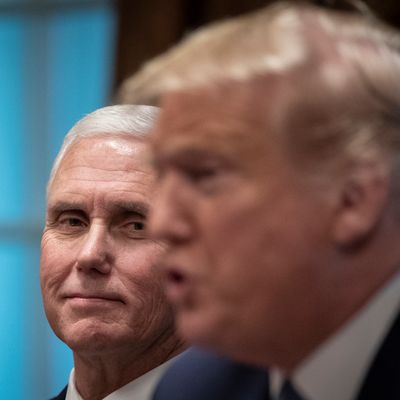
At a press conference on the U.S. response to the Covid-19 novel coronavirus, President Trump sounded surprised by basic statistics related to public health, including the substantial number of Americans that die from the flu every year. “The flu in our country kills from 29,000 people to 69,000 people a year,” Trump claimed. “That was shocking to me … These are people that have died from the flu. What we call the flu. Hey, did you get your flu shot?”
As for the potential outbreak of coronavirus in the United States — and the administration’s conflicting responses to the emerging crisis — the president wasn’t much more articulate. “We’ll see what happens,” Trump said, while claiming that the “risk to the American people remains very low.” After holding up a printout from Johns Hopkins showing that the U.S. ranked No. 1 in preparedness for a potential epidemic, he said that the university, “I guess, is a highly respected, great place.” Later, answering press questions, the president disagreed with the Centers for Disease Control and Prevention assessment that spread of coronavirus in the U.S. is inevitable.
A few minutes into the conference, Trump announced “exactly right now” that he is putting “Vice-President Mike Pence in charge” of the White House coronavirus task force. “Mike will report back to me, but he’s got a certain talent for this.”
According to his record as a lawmaker and as the governor of Indiana, Pence does not have a talent for managing public health crises. As late as 2000 — the year he was first elected to Congress — the vice-president wrote in an op-ed that “smoking does not kill.” As the governor of Indiana, Pence responded to an outbreak of HIV cases among IV-drug users in rural Scott County near the Kentucky border with prayer. (In Congress, he voted to cut funding for the county’s only HIV-testing center.) Eventually, Pence issued an executive order allowing syringes to be distributed in the county for a needle-exchange program, which helped dampen the crisis.
During the press conference, the Washington Post reported on the first U.S. coronavirus case of unknown origin.






























